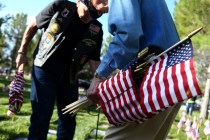Your words are a gift for others
My inspiration for this column often comes from some (un)official holiday, but not much is celebrated in August. Maybe it’s too hot or folks are busy with vacations. There is also the issue of winding down from the summer and gearing up for the kids heading back to school. Now there is inspiration! Gearing up for learning.
One of the reasons I committed to this column is that I love words! I love learning new words. I love the etymology of words (word history), I love orthography (the evolution of word spelling), I love eponyms (words named after something or someone). I love double entendres, alliteration and neologisms (newly invented words) — I have even formulated a few myself.
I love anything and everything to do with words! I dare say that is why I can never resist including at least one dizzying word in my column that I hope inspires some reader to turn to their dictionary.
Words are ever so essential. Words are how we communicate. Whether we use voice, sign or scribe — we use some symbolic form to disclose our thoughts. Words are incredibly important to learning. Definitions, synonyms and phraseology are all critical to writing, speaking and understanding. Without language (which is made of words), we falter and isolate.
Math is no exception. Math can be incomprehensible if it is taught without teaching its vocabulary. Math has a lexicon, just like any other language. Like math, music also has a phraseology. Left-brain, right-brain, logic, creativity; there is a linguistics to life.
Perhaps this month’s column was inspired when I came upon a word that rolled around in my brain this past week. The word? Hemidemisemiquaver. That almost outperforms supercalifragilisticexpialidocious — almost. Go ahead, pull out your dictionary.
Robert Louis Stevenson, in “Essays in the Art of Writing,” states “Music and literature … contrive their pattern of sounds in time, or in other words, of sounds and pauses. Talking may be made in broken words” but true communication — an exchange of ideas, requires the communicator “to plait or weave his meaning.”
Our lives are made of events that plait or weave actions into what we define as character or ego. A person is characterized using words, (“s/he has bad blood,” “s/he is brilliant”). Each of us has traversed paths over which we had to stride with courage as we turbidly slithered over either financial or geographic crevasses where a misstep could have brought about our demise. We have each ecstatically overcome a challenge, or mastered a feat, bringing pulchritudinous joy to ourselves or others. We have each lived our story of life. We have learned, or developed our character, through this journey. Yet, unless we use words to define our learnings, our angst or bliss may be lost forever.
Nan Merrick Phiffer in “Memoirs of the Soul,” emphasizes that “external facts about a life can be researched generations later, but the inner life is irrevocably lost unless written during one’s lifetime.”
As I research ancestors, I read “external facts” about their lives and wonder what were their thoughts as they spent more than 70 days in the hold of the Mayflower, left family behind, plowed a new nation, and fought against their biological brother in so many of our nation’s birthing wars. How I long for their own words, their learnings.
Not only does recording life’s experiences in words leave a legacy for others, it also allows the writer to gain strength from past events, relive joys and learn from regrets. It allows one to examine and re-examine the events of a day, a week, a decade.
I recently helped a friend compile thoughts and photos of her life. We were close before we worked on this project, but our friendship now has a new depth — I had the privilege of sharing her life by proxy, sharing her learnings.
We often are busy with life and don’t stop to record our thoughts or sort out feelings on paper. Take a moment today, each day, to jot down on a calendar, in your phone (then print and save) at least one thought about each day or week. As Agatha Christie put it ...“The best time for planning a book is while you’re doing the dishes.”
Start your record over the morning’s dishes. Ponder learnings of last week, your life. Write down your thoughts, your memories. Every person who treads this earth leaves a legacy, some quietly, some boisterously. We have each left our mark, no matter how privately. Allow yourself the privilege of leaving a record, short or long, through the gift of words, about the learnings of your life. You will learn much in the process.
Cat Trico has been a resident of Boulder City since 2003 and is a past president of the Senior Center and co-founder of the Decker Lake Wetlands Preserve. As an author and editor, she contributed to “Rights, Responsibilities, and Relationships” for youth. She can be reached at cat.circa1623@gmail.com.



